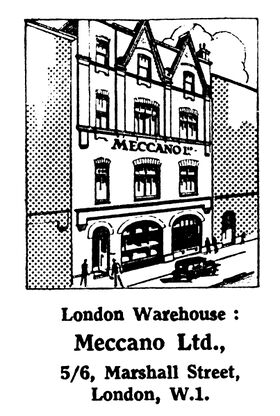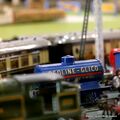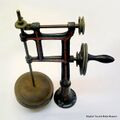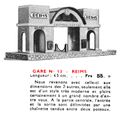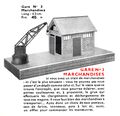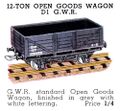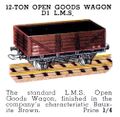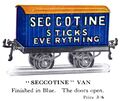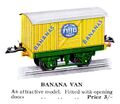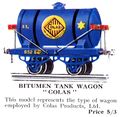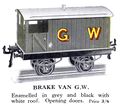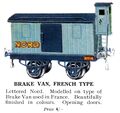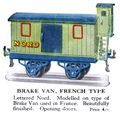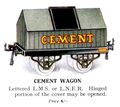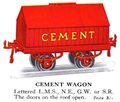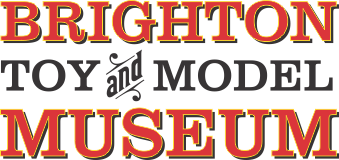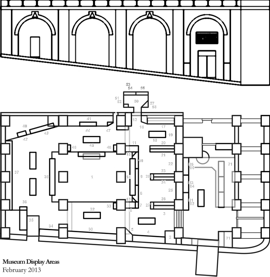Category:Meccano Ltd
Meccano/Hornby/Dinky :
Mechanics Made Easy | Meccano | Super Models | Motor Car Constructor | Aeroplane Constructor | Dinky Builder | X-Series | Plastic
W UK US FR DE 1900s | 1910s | 1920s | 1930s | 1940s | 1950s | 1960s | 1970s |
| Toy Brands and Manufacturers |
|---|
Meccano Ltd |
| 1908 - 1979 |
| Meccano - Dinky - Hornby - Kemex - Elektron - Circuit 24 |
1927: Meccano's Binns Road Factory [image info]
1929: Marshall Street, London warehouse [image info]
1930s: Some of Meccano Ltd's main brands, printed on a roll of 1930s wrapping-paper [image info]
1935: Meccano Jerseys advert [image info]
1956: Meccano Ltd.: "Toys of Quality" general catalogue front cover [image info]
Meccano Ltd. was founded by Frank Hornby in 1908 to manufacture Hornby's metal construction kits, and became one of the biggest and most influential toymaking companies in Britain in the first half of the Twentieth Century.
~1901, "Elliott and Hornby"
Hornby's metal sets had previously been sold as "Mechanics Made Easy" by "Elliott and Hornby" (E&H). "E&H" had consisted of Frank Hornby (who was then working as a clerk in a meat importing company), and his employer, David Elliott, who loaned Frank five pounds to patent his invention in 1901, and then invested in Frank's new startup business.
~1908, Meccano Ltd.
The E&H business initially made a loss, but after a few years, "MME" sales started to escalate to the extent that Hornby was able to quit his day job, raise enough capital to buy out his employer, commission a logo for the product under the new name "Meccano" (UK Registered Trademark UK00000296321, September 1907), and launch Meccano Ltd as a limited company. Most Meccano parts had previously been made for Hornby by local engineering companies, but problems with the large number of different suppliers and inconsistent build quality and delivery times made it clear to Hornby that he needed to manufacture most (if not all) of the parts in-house, and the capital raised for Meccano Ltd allowed the company to move from 10 Duke Street to 274 West Derby Road.
Binns Road
Sales continued to accelerate with the new catchy brandname, with and the company kept having to move to larger premises, until in 1913/14, Hornby took the decision to build a new factory on a plot of land at Old Swan that was large enough to allow for continued expansion for the foreseeable future. Hornby made astute use of social networking, running Meccano competitions to raise interest in the product (and obtain new designs), and founding the Meccano Guild. With Meccano Magazine promoting Meccano almost as a religious movement, and the company writing whimsical stories set in Meccanoland, the Binns Road factory assumed a mythical status.
Diversification
When the unpopularity of German-produced products after WW1 broke the previous dominance of German companies, Meccano Ltd moved into model railways, with the Hornby Clockwork Train introduced in ~1920, initially as an extension of the Meccano system. The new Hornby Trains became wildly successful, and when the advent of new miniaturised clockwork and electric motors made smaller model trains possible, Meccano launched Hornby Dublo, using the new half-size 00-gauge track size that had been pioneered by Bing (and Stefan Bing's Trix company), with Bassett-Lowke.
As the range of Hornby gauge 0 accessories grew to include last lead figures and miniatures, Meccano Ltd reinvented their lead Hornby Modelled Miniatures range as Dinky Toys, using the new "MAZAC" metal alloy, and the rate at which the Dinky range expanded meant that the company effectively had the UK market for diecast toys to itself for over a decade.
Promotion
Meccano Ltd didn't seem to miss a trick when it came to promotion and developing brand loyalty, and the company founded networks of clubs and experimented with a range of publications that promoted the Hornby and Meccano names, the most successful being Meccano Magazine, which carried serious articles on engineering news and (engineering-related) current affairs.
User-groups
After the success of the Meccano Guild as a tool for supporting users and promoting the brand, the company went on to found the Hornby Railway Company (for users of Hornby Trains), the Dinky Toys Club, and the Hornby Speed Boat Club.
Post-war decline
Meccano Ltd had trouble adjusting to the post-war environment. Without its founder (who died in 1936) it had trouble replicating the innovation that had characterised its early and between the wars years, and it failed to embrace new markets and new technologies such as plastics. Meccano "coasted" on the basis of its existing ranges for too long - Meccano was already too complete to lend itself to radical change, the larger "gauge 0" trains were now "legacy" products that reverted to being clockwork-only, the Hornby Dublo trains were expensive, troubled by a difficult switchover between three-rail to two-rail formats, and difficult to make more cheaply, and while the Dinky Toys range continued to be updated, it became subject to ferocious competition from Corgi Toys and other companies.
Meccano Ltd were bought out by fellow UK toymaking giants Lines Brothers in 1962/63, who updated the product lines but in turn went bankrupt a few years later in 1971 and had their assets bought by Airfix.
Binns Road finally closed their doors in 1979, marking what many saw as the end of an era in British toymaking.
External links
Subcategories
This category has the following 79 subcategories, out of 79 total.
B
- Binns Road (2 F)
C
- Circuit 24 cars (4 F)
- Circuit 24 sets (2 F)
- Circuit 24 track (14 F)
- Colouring-in sheets (10 F)
D
- Delivery Vans (Dinky Toys 28, first casting) (6 P, 19 F)
- Dinky Builder (2 P, 9 F)
- Dublo 1938 (6 P, 23 F)
- Dublo Dinky Toys (15 P, 30 F)
E
- Elektron (3 P, 12 F)
F
- Frank Hornby Week (4 P, 5 F)
H
- Hornby Complete (1 P, 18 F)
- Hornby Dublo train sets (8 P, 7 F)
- Hornby gauge 0 postwar (2 P, 47 F)
- Hornby M Series locomotives (4 P, 13 F)
- Hornby MLDL (4 P, 1 F)
- Hornby No 0 locomotives (4 P, 4 F)
- Hornby No1 locomotives (5 P, 11 F)
- Hornby No1 Special locomotives (3 P, 7 F)
- Hornby No1 Special Tank locomotives (3 P, 7 F)
- Hornby No1 Tank locomotives (7 P, 14 F)
- Hornby No2 locomotives (3 P, 8 F)
- Hornby No2 Special locomotives (7 P, 16 F)
- Hornby No2 Special Pullman Coaches (10 P, 8 F)
- Hornby No2 Special Tank locomotives (5 P, 8 F)
- Hornby No2 Tank locomotives (6 P, 9 F)
- Hornby No3 locomotives (4 P, 13 F)
- Hornby No4 locomotives (2 P, 5 F)
- Hornby No501 locomotives (empty)
- Hornby Railway Company (11 F)
- Hornby Series (display) (37 P, 21 F)
- Hornby Speed Boat Club (1 F)
- Hornby Trains post-war (6 P, 2 F)
K
- Kemex (2 P, 11 F)
M
- Meccano Aeroplane Constructor (6 P, 36 F)
- Meccano Guild (2 P, 13 F)
- Meccano Lab (8 F)
- Meccano Magazine sections (39 F)
- Meccano Parts (52 F)
- Meccano Super Models (1 P, 2 F)
- Meccano X Series (3 P, 13 F)
- Mechanics Made Easy (5 P, 10 F)
- Modern Hornby 00-gauge locomotives (7 P, 4 F)
P
- Pushbutton train (13 P)
T
- The Hornby Book of Trains (19 P, 10 F)
- The Legend of Hornby (display) (26 P, 20 F)
- The Life Story of Meccano (7 P, 2 F)
- Themed Meccano sets (2 P)
W
- Wooden trains (2 P, 2 F)
Z
- Zulu Trains (1 P, 6 F)
Pages in category ‘Meccano Ltd’
The following 200 pages are in this category, out of 374 total.
(previous page) (next page)A
B
- Barnstaple Pullman train set 2035 (Hornby Dublo)
- Battleship, Nelson Class (Dinky Toys 50b)
- Bayko Building Outfit 13 (Meccano Ltd)
- Bedford Flat Truck (Dublo Dinky Toys 066)
- Bitumen Tank Wagon, Colas (Hornby 0 gauge)
- Bitumen Tank Wagon, Colas (Hornby Series)
- Blue Pullman carriage (Hornby Series)
- Bogie Bolster Wagon D1 (Hornby Dublo 4610)
- BR Class 55 Deltic diesel locomotive D9012 "Crepello" (Hornby Dublo 2234)
- Brake Van GW, pb (Hornby Series)
- Brake Van, GNR (Hornby Series)
- Bramham Moor locomotive 201 (Hornby Series E220)
- Breakdown Car (Dinky Toys 30e)
- Breakdown Crane and Van, brown, (Hornby Series)
- Breakdown Crane Wagon (Hornby M0)
- Breakdown Van and Crane, grey, LMS (Hornby Series)
- Bristol Castle locomotive 7013, EDLT20 (Hornby Dublo)
- Butter Churn, 1912 (Meccano Ltd)
C
- Cable Drum (Hornby Dublo 1521)
- Cadbury's Chocolate Van (Hornby 1930s)
- Cadbury's Van, pb (Hornby Series)
- Carr's Biscuit Van, 1920s (Hornby Series)
- Carr's Biscuit Van, 1930s (Hornby Series)
- Claribel railway coach (Hornby R112)
- Coal Wagon, 'Hornby Railway Company' (Hornby Series)
- Coal Wagon, 'Meccano' (Hornby Series)
- Colman's Mustard Van (Hornby 1924)
- Colman's Mustard Van, pb (Hornby Series)
- Commer Express Delivery Van (Dublo Dinky Toys 063)
- Coronation locomotive 6220 (Hornby R.685)
- Coronation locomotive 6220 (Hornby R.864)
- Coronation Scot train (Hornby R3092)
- Countryside Section M1 (Hornby Series)
- County of Bedford locomotive 3821 (Hornby Series E220)
- Cows (Dinky Toys 2b)
- Crane Truck, early (Hornby Series)
- Crawford's Biscuit Van type 3, pb (Hornby Series)
- Crawford's Biscuit Van, 1920s (Hornby Series)
- Crawford's Biscuit Van, 1920s, variation (Hornby Series)
- Crawford's Biscuit Van, 1930s, variation (Hornby Series)
- Cruiser HMS York 90 (Dinky Toys 50d)
- Cruiser, HMS Effingham (Dinky Toys 50c)
- Cutting No0 (Hornby Series)
D
- Deltic Diesel-Electric locomotive, box (Hornby Dublo 2234)
- Dinky Builder lorry
- Dinky Builder Outfit No1
- Dinky Toys Club badge
- Dinky Toys Collectors’ Association (DTCA)
- Double Wine Wagon (Hornby Series)
- Duchess of Atholl train set EDP2 (Hornby Dublo)
- Duchess of Montrose train set EDP12 (Hornby Dublo)
E
F
- Famous Trains by Cecil J. Allen (Meccano Library No.1)
- FH150 Project
- FH150, Frank Hornby Anniversary Project (2012-12)
- Flat Truck (Dinky Toys 25c)
- Flying Scotsman No3 locomotive 4472 (Hornby Series)
- Folkestone Flyer No2 Special LMS train set (Hornby Series)
- Foot Bridge with signals (Hornby Series)
- Footbridge D1, concrete-style (Hornby Dublo)
- Footbridge, M Series (Hornby Series)
- Frank Hornby 1901 patent
- Frank Hornby Night
- Frank Hornby Train Running Day
- Frank Hornby Week - Children's Play Day
- Frank Hornby Week guided tours
- Fyffes Banana Van (Hornby gauge 0)
- Fyffes Banana Van, pb (Hornby Series)
G
- Gannet, No3 speedboat, clockwork (Hornby Speedboats, pre-war)
- Garage (Dinky Toys 45)
- Gas Cylinder Wagon (Hornby Series)
- Gas Cylinder Wagon, green, SR (Hornby)
- Gas Cylinder Wagon, LMS-GC (Hornby Series)
- George the Fifth locomotive 2663 (Meccano Ltd / Hornby No.00 / Hornby M3)
- Goods Platform, 1926 (Hornby Series)
- Goods Platform, 1929 (Hornby Series)
- Goods Train Set, GWR, Tank Loco 6699 (Hornby Dublo EDG7)
- Goods Train Set, SR (Hornby Dublo EDG7)
- Goods Wagon (Hornby M0)
- Goods Wagon, GW, pb (Hornby Series)
- GPV Gunpowder Van, GW, grey (Hornby Series)
- Great Western 5500 locomotive, 6V (Hornby EPM16)
- Gunpowder Van, LMS (Hornby Series)
H
- Hall's Distemper 'workmen' sign (Dinky Toys 13)
- Hall's Distemper Advertisement (Hornby Modelled Miniatures)
- Hopper Wagon, grey, LNER (Hornby Series)
- Hopper Wagon, pb (Hornby Series)
- Hopper Wagon, red, SR (Hornby Series)
- Hopper Wagon, red, SR, 1930s (Hornby Series)
- Hornby 150 at the Museum of Liverpool (Aug 2013)
- Hornby 501 loco, BR 50153 (Hornby Trains)
- Hornby Complete Railway Set M10
- Hornby Dublo revolving illuminated shop display sign
- Hornby Hoverer
- Hornby No0 Goods Train Set, LNER 5096 (Hornby Series)
- Hornby Railway Station No.4E, 1 (Hornby Series)
- Hornby Railway Station No.4E, 2 (Hornby Series)
- Horses (Dinky Toys 2a)
- House (Bayko, Meccano Ltd)
- How to Use Meccano Parts (Meccano Ltd)
- Hydraulic Buffer Stops, blue, No2E (Hornby Series)
- Hydraulic Buffer Stops, green and gold, No2 (Hornby Series)
- Hydraulic Buffer Stops, No3E (Hornby Series)
J
L
- Lamp Standard No1E Electrical (Hornby Series)
- Lamp Standard No2E Electrical (Hornby Series)
- Lamp standard, single globe (Hornby Series)
- Lattice Girder Bridge, 1921 (Hornby Series)
- Level Crossing (Hornby Series)
- LMS locomotive 6161 (Hornby Series)
- LNWR locomotive 3435 (Hornby Series)
- LNWR wagon, type 1 (Hornby MLDL)
- Loading Gauge (Hornby Dublo 5035)
- Loading Gauge, ~1925 (Hornby Series)
- Loading Gauge, ~1926 (Hornby Series)
- Loading Gauge, ~1934 (Hornby Series)
- Loco Southern 29, No1 Electric Tank Loco (Hornby Series)
- Loco Southern 29, No1 Tank Loco (Hornby Series)
- Locomotive GW 2221, No2 Special Tank (Hornby Series)
- Locomotive GW 2711, No2 (Hornby Series)
- Locomotive LMS 0-4-0, No1 Tank Loco (Hornby Series)
- Locomotive LMS 1185 (Hornby Series E220)
- Locomotive LMS 2051, Tank Loco No2 (Hornby Series)
- Locomotive LMS 8712, No1 Special (Hornby Series)
- Locomotive LNER 0-4-0, No1 Tank Loco (Hornby Series)
- Locomotive LNER 2162, No1 Special (Hornby Series)
- Locomotive LNER 2900, Tank Loco No1 (Hornby Series)
- Locomotive LNER 460, Tank Loco No2 (Hornby Series)
- Locomotive No2 Special, LMS 1185 (Hornby Series)
- Locomotive Southern 1759, No.2 Special (Hornby Series)
- Locomotive Southern B 602,Tank Loco No2 (Hornby Series)
- Locomotive Southern B 604,Tank Loco No2 (Hornby Series)
- Lord Nelson loco 850, No3 (Hornby Series)
- Template:LSoM
- Luggage Van No.1, brown, SR (Hornby Series)
- Luggage Van No.2, GW (Hornby Series)
- Lumber Wagon No.1, L&NER (Hornby Series)
- Lumber Wagon No.2, LMS (Hornby Series)
M
- M Series Station Set
- M0 Locomotive 6161 (Hornby Series)
- M1 Locomotive 3435 (Hornby Series)
- Maghull Hornby Festival (May 2013)
- Market Gardener's Van (Dinky Toys 25f)
- McAlpine Side-Tipping Wagon, pb (Hornby Series)
- Meccano Accessory Outfit 00A
- Meccano Accessory Outfit 3a
- Meccano Aero Clockwork Motor No2 (Meccano M231)
- Meccano Aeroplane Constructor Outfit (No2 Special)
- Meccano Clockwork Motor
- Meccano Clockwork Motor No1
- Meccano Clockwork Motor No1A
- Meccano Clockwork Motor No2, black, 1912 (Märklin for Meccano Ltd)
- Meccano Clockwork Motor No2, silver, 1912 (Märklin for Meccano Ltd)
- Meccano Electric Motor E020
- Meccano Electric Motor E20R(S)
- Meccano Giant Block-Setting Crane (Meccano Super Models No 4)
- Meccano Highway Vehicles Set (Set 3)
- Meccano in America
- Meccano Ltd timeline
- Meccano Ltd wrapping paper
- Meccano Parts and How to Use Them (Meccano Ltd)
- Meccano Set (unidentified)
- Meccano Set 6 - L'Equipment Portuaire (Port Equipment) set
- Meccano six-speed electric motor 228
- Meccano Standard Mechanisms (Meccano Ltd)
- Meccano Standard Mechanisms, US edition (Meccano Ltd)
- Meccano Stephenson's Rocket (retailer promotional model)
- Meccanoland
- Metropolitan Train, HV (Hornby Series)
- Metropolitan underground locomotive, 110V (Hornby)
- Metropolitan underground locomotive, 6V (Hornby)
- Milk Cans with Truck (Hornby Series)
- Milk Tank Wagon, Nestlé's Milk (Hornby Series)
- Milk Tank Wagon, United Dairies (Hornby Series)
- Milk Tank Wagon, United Dairies, early (Hornby Series)
- Milk Traffic Van (Hornby gauge 0)
- Miniature Luggage and Truck (Hornby Railway Accessories No. 1)
- Mogul Fire-Fighter (Meccano)
N
- No 0 locomotive 2710 (Hornby Series)
- No 0 Locomotive 4797 (Hornby Series)
- No. 1 Luggage Van (Hornby gauge 0)
- No. 1 Special Tank Locomotive 70 (Hornby Series)
- No1 Special Electric Tank Locomotive, Southern 516 (Hornby Series E120 )
- No1 Special Locomotive, electric, Southern 1179 (Hornby Series E120)
- No2 Tank Loco LMS 2052 (Hornby Series)
- No21 Passenger Train Set, loco 60985 (Hornby Trains)
Media in category ‘Meccano Ltd’
The following 200 files are in this category, out of 962 total.
(previous page) (next page)- 10-ton Army Truck, Dinky Supertoys 622 (MM 1957-12).jpg 625 × 379; 38 KB
- 90-degree Standard Curve, semi-rigid, Circuit24 track(C24Man ~1963).jpg 1,086 × 449; 71 KB
- A Milking Shed, in Bayko (MM 1963-10).jpg 1,103 × 1,393; 264 KB
- A New Game Of Skill, Circuit 24 (C24Man ~1963).jpg 3,000 × 1,885; 769 KB
- Always Choose Dinky Toys (MM 1960-09).jpg 1,092 × 1,161; 103 KB
- Area 37.jpg 800 × 799; 330 KB
- Aston Martin, Circuit 24 slotcar (C24Man ~1963).jpg 1,812 × 1,047; 454 KB
- Autorail (HornbyFR 1935).jpg 4,464 × 751; 237 KB
- Bayko Building Outfits in New Colours (MM 1960-09).jpg 1,083 × 1,457; 192 KB
- Bayko Builds Best (MCat ~1963).jpg 1,200 × 838; 210 KB
- Bayko Choice of Five (MCat ~1963).jpg 1,200 × 840; 211 KB
- Binding the MM (MM 1929-01).jpg 394 × 1,181; 118 KB
- Biplane, No0 Aeroplane Outfit (1939 catalogue).jpg 560 × 364; 30 KB
- Blaw Knox Heavy Tractor, Dinky Toys 563.jpg 1,024 × 768; 532 KB
- Book of Meccano Products (MM 1934-10).jpg 2,229 × 2,945; 971 KB
- Building your own motor cars, p776 (MM 1932-10).jpg 1,204 × 1,617; 490 KB
- Butter Churn (Meccano Ltd).jpg 1,223 × 1,224; 121 KB
- Cattle Truck GWR, Hornby Dublo D1 (HBoT 1939).jpg 560 × 526; 80 KB
- Chicane, Circuit 24 track (C24Man ~1963).jpg 1,073 × 408; 54 KB
- Circuit 24 logo (1962).jpg 800 × 479; 51 KB
- Circuit 24 manual, rear cover (C24Man ~1963).jpg 3,000 × 1,876; 871 KB
- Circuit 24 sets (MCat ~1963).jpg 1,600 × 1,117; 242 KB
- Circuit 24 slotcar system (MM 1962-12).jpg 2,394 × 3,000; 1.47 MB
- Circuit24 Le Mans in Miniature (MCat ~1963).jpg 2,200 × 763; 369 KB
- Colouring-in sheet - 1930s 4-4-2 Tank Engine.jpg 3,508 × 2,482; 1,005 KB
- Colouring-in sheet - Design your own Loco.jpg 3,508 × 2,482; 994 KB
- Colouring-in sheet - Dinky Bus.jpg 3,508 × 2,482; 874 KB
- Colouring-in sheet - FH150 3D logo.jpg 3,508 × 2,482; 1,007 KB
- Colouring-in sheet - Hornby Series Wagon.jpg 3,508 × 2,482; 803 KB
- Colouring-in sheet - M-Series Locomotive.jpg 3,508 × 2,482; 830 KB
- Colouring-in sheet - Pullman Carriage.jpg 3,508 × 2,482; 1.32 MB
- Colouring-in sheet - Racer III.jpg 3,508 × 2,482; 812 KB
- Colouring-in sheet - Seccotine Wagon.jpg 3,508 × 2,482; 940 KB
- Contemporary Brickplayer (MM 1963-10).jpg 722 × 1,725; 248 KB
- Coronation6220 HornbyR685.jpg 1,024 × 768; 98 KB
- Corridor Coach LNER, Hornby Dublo D1 (1938 Dublo brochure).jpg 801 × 387; 77 KB
- Countryside Sections (HBoT 1932).jpg 1,092 × 812; 203 KB
- Countryside Sections closeup01 (MM 1933-06).jpg 3,097 × 1,765; 907 KB
- Countryside Sections closeup02 (MM 1933-06).jpg 2,756 × 2,061; 989 KB
- Countryside Sections closeup03 (MM 1933-06).jpg 2,768 × 1,953; 970 KB
- Countryside Sections, assembled (HBoT 1932).jpg 4,289 × 1,521; 926 KB
- Couplings, Circuit 24 track (C24Man ~1963).jpg 867 × 503; 44 KB
- Dick's Visit to Meccanoland, small-ad (MM 1929-01).jpg 728 × 487; 71 KB
- Dinky Builder (1935 BHTMP).jpg 1,660 × 1,204; 383 KB
- Dinky Builder (MM 1935-06).jpg 1,543 × 2,020; 810 KB
- Dinky Builder (MM 1935-11).jpg 2,408 × 3,235; 1.1 MB
- Dinky Builder (MM 1938-11).jpg 2,310 × 1,566; 616 KB
- Dinky Builder - The house that Jack and Jill built (MM 1958-10).jpg 1,569 × 2,149; 499 KB
- Dinky Builder fullpage (MM 1936-10).jpg 1,216 × 1,604; 569 KB
- Dinky Builder, furniture (MM 1935-11).jpg 1,881 × 831; 162 KB
- Dinky Toys - A Fascinating Collecting Hobby (MC 1939).jpg 1,405 × 1,305; 191 KB
- Dinky Toys 50, Ships of the British Navy (box art).jpg 800 × 600; 302 KB
- Dinky Toys 52 hull No. 534 (Queen Mary).jpg 800 × 508; 322 KB
- Dinky Toys Catalogue 1960, advert (MM 1960-09).jpg 1,506 × 1,085; 248 KB
- Dinky Toys Club badge.jpg 570 × 525; 97 KB
- Dinky Toys Dolls House Furniture, and Dolly Varden dollhouse (MM 1936-10).jpg 1,204 × 1,621; 400 KB
- Dinky Toys Dolly Varden Doll's House (1939 catalogue).jpg 1,533 × 2,695; 466 KB
- Dinky Toys Mechanised Units (MM 1939-11).jpg 1,184 × 1,600; 683 KB
- Dinky Toys Revised Prices (MM 1939-11).jpg 1,600 × 509; 477 KB
- Dublo Dinky Toys (MM 1957-12).jpg 908 × 375; 73 KB
- Duchess of Atholl loco, boxed (Hornby Dublo).jpg 1,024 × 768; 485 KB
- Early Meccano Ltd red and gold foil sticker.jpg 1,200 × 858; 820 KB
- Early Meccano steam engine, detail.jpg 931 × 1,200; 328 KB
- Early Meccano steam engine.jpg 904 × 1,200; 92 KB
- Elektron Electrical Outfits (MM 1933-06).jpg 1,589 × 2,147; 842 KB
- Elektron Electrical Outfits (MM 1935-11).jpg 1,165 × 2,717; 538 KB
- Elektron Electrical Outfits advert01.JPG 1,605 × 2,175; 765 KB
- Engine Shed, Hornby Dublo D1 (1939-).jpg 632 × 540; 76 KB
- Eton 900 locomotive detail, Hornby.jpg 800 × 600; 381 KB
- Eton locomotive 900 (MM 1937-08).jpg 1,583 × 729; 286 KB
- Eton locomotive 900 article (MM 1937-08).jpg 2,438 × 3,458; 1.4 MB
- Famous Trains book (MM 1932 02).jpg 703 × 583; 86 KB
- FH-01 Meet Frank Hornby.jpg 1,080 × 1,920; 569 KB
- FH-05 Mechanics Made Easy (1902).jpg 1,080 × 1,920; 634 KB
- FH-10 - Meccano Ltd (1908).jpg 1,080 × 1,920; 755 KB
- FH-20 The Hornby Train (1920).jpg 1,080 × 1,920; 841 KB
- FH-30 Hornby trains - Evolution.jpg 1,080 × 1,920; 1.13 MB
- FH-70 - Hornby Dublo (1938).jpg 1,080 × 1,920; 894 KB
- FH150 Poster A4 - fr.jpg 2,486 × 3,508; 1 MB
- FH150 Poster A4 with 3mm bleed.pdf 0 × 0; 948 KB
- FH150 Poster A4.jpg 2,486 × 3,508; 1,018 KB
- FH150 poster and Ferriswheel.jpg 1,024 × 577; 344 KB
- Folkestone Flyer No2 Special train Set, SR (HBoT 1938).jpg 2,599 × 1,641; 456 KB
- Footbridge, Hornby Dublo D1 (1939-).jpg 640 × 531; 65 KB
- Frank Hornby 150th anniversary brochure, front.jpg 2,481 × 3,508; 1.7 MB
- Frank Hornby Night.jpg 1,024 × 577; 251 KB
- Frank Hornby portrait.jpg 270 × 390; 14 KB
- Frank Hornby Week.jpg 1,024 × 229; 130 KB
- Frank Hornby Week.png 1,024 × 229; 60 KB
- FrankHornby150 (FH150) logo, dark red.png 640 × 429; 35 KB
- French Hornby, gauge 0, selection.jpg 2,133 × 1,600; 505 KB
- FROG Model Aircraft, Make Light of the Blackout (MM 1939-11).jpg 1,191 × 1,600; 1.25 MB
- Gare No1 (HornbyFR 1935).jpg 2,031 × 1,423; 305 KB
- Gare No10, Nice (HornbyFR 1935).jpg 1,717 × 1,305; 271 KB
- Gare No11, Biarritz (HornbyFR 1935).jpg 1,766 × 1,193; 242 KB
- Gare No13, Reims (HornbyFR 1935).jpg 1,421 × 1,365; 172 KB
- Gare No14, Lyon (HornbyFR 1935).jpg 2,504 × 1,549; 350 KB
- Gare No2 (HornbyFR 1935).jpg 1,978 × 1,538; 339 KB
- Gare No3, Marchandises (HornbyFR 1935).jpg 1,794 × 1,729; 342 KB
- Gas cylinder wagon, SR, green (Hornby).jpg 800 × 600; 239 KB
- George the Fifth loco 2663 (Meccano Ltd).jpg 1,024 × 639; 80 KB
- Gilbert logo.jpg 1,728 × 607; 61 KB
- Go-Kart Racing Game, Circuit 24 (MM 1963-10).jpg 2,204 × 2,832; 943 KB
- Go-Kart, Circuit 24 slotcar (C24Man ~1963).jpg 1,802 × 1,437; 414 KB
- Goods Brake Van GW, Hornby Dublo D1 (DubloBrochure 1938).jpg 545 × 505; 81 KB
- Goods Brake Van LMS, Hornby Dublo D1 (DubloBrochure 1938).jpg 536 × 499; 80 KB
- Goods Brake Van LNER, Hornby Dublo D1 (DubloBrochure 1938).jpg 537 × 515; 70 KB
- Goods Brake Van SR, Hornby Dublo D1 (DubloBrochure 1938).jpg 531 × 503; 73 KB
- Goods Depot D1, Hornby Dublo (1939-).jpg 695 × 445; 58 KB
- Goods Train Set, Hornby Dublo EDG7 (DubloBrochure 1938).jpg 2,118 × 871; 429 KB
- Goods Van 12-Ton GWR, Hornby Dublo D1 (DubloBrochure 1938).jpg 503 × 503; 74 KB
- Goods Van 12-Ton LMS, Hornby Dublo D1 (DubloBrochure 1938).jpg 499 × 483; 73 KB
- Goods Van 12-Ton LNER, Hornby Dublo D1 (DubloBrochure 1938).jpg 507 × 545; 81 KB
- Goods Van 12-Ton SR, Hornby Dublo D1 (DubloBrochure 1938).jpg 489 × 511; 70 KB
- Goods Wagon Open 12-Ton SR, Hornby Dublo D1 (DubloBrochure 1938).jpg 503 × 489; 72 KB
- Half Flyover, Circuit24 track (C24Man ~1963).jpg 1,145 × 525; 64 KB
- Half Staight - flexible, Circuit 24 track (C24Man ~1963).jpg 704 × 389; 37 KB
- Halfords-branded Meccano Ltd catalogue for 1939-1940, front cover.jpg 1,200 × 798; 273 KB
- Hamleys model railway (MM 1931-12).jpg 1,204 × 1,501; 249 KB
- Harbutt's Plasticine, Meccano (MM 1938-11).jpg 577 × 1,470; 227 KB
- HBOT 1938-39 p15 Princess Elizabeth model.jpg 1,638 × 1,235; 575 KB
- High Wing Airliner, No2 Special Aeroplane Outfit (1935 BHTMP).jpg 772 × 548; 59 KB
- High Wing Monoplane, No0 Aeroplane Outfit (1935 BHTMP).jpg 837 × 561; 55 KB
- High Wing Monoplane, No0 Aeroplane Outfit (1939 catalogue).jpg 711 × 375; 31 KB
- Hornby 'Golden Arrow' No3 train set (HBoT 1938).jpg 3,041 × 1,641; 592 KB
- Hornby 'Seccotine' Van (1928 HBoT).jpg 715 × 603; 72 KB
- Hornby and Zulu Trains (MM 1924-03).jpg 1,605 × 2,114; 453 KB
- Hornby Banana Van, Fyffes (HBoT 1931).jpg 1,201 × 1,045; 156 KB
- Hornby Barrel Wagon (HBoT 1931).jpg 1,193 × 889; 118 KB
- Hornby Bitumen Tank Wagon, Colas (HBoT 1930).jpg 693 × 675; 83 KB
- Hornby Book of Trains 1925.jpg 1,671 × 1,240; 368 KB
- Hornby Book of Trains cover 1926.jpg 650 × 490; 125 KB
- Hornby Book of Trains cover 1927-28.jpg 656 × 482; 134 KB
- Hornby Book of Trains cover 1933-34.jpg 656 × 495; 132 KB
- Hornby Book of Trains cover 1937-38.jpg 661 × 496; 138 KB
- Hornby Book of Trains cover 1938-39.jpg 657 × 495; 136 KB
- Hornby Book of Trains cover 1939-40.jpg 662 × 494; 136 KB
- Hornby Box Car, American Type (HBoT 1930).jpg 856 × 581; 94 KB
- Hornby Brake Van GW (1926 HBoT).jpg 1,453 × 1,243; 199 KB
- Hornby Brake Van GW (1928 HBoT).jpg 729 × 645; 71 KB
- Hornby Brake Van LMS (1925 HBoT).jpg 762 × 614; 64 KB
- Hornby Brake Van LMS (1928 HBoT).jpg 735 × 597; 67 KB
- Hornby Brake Van LNER (1925 HBoT).jpg 737 × 682; 70 KB
- Hornby Brake Van LNER (1928 HBoT).jpg 731 × 673; 70 KB
- Hornby Brake Van SR (1928 HBoT).jpg 725 × 649; 69 KB
- Hornby Brake Van, French Type (1927 HBoT).jpg 741 × 697; 97 KB
- Hornby Brake Van, French Type (1928 HBoT).jpg 745 × 707; 93 KB
- Hornby Breakdown Van and Crane (1927 HBoT).jpg 1,019 × 741; 118 KB
- Hornby Breakdown Van and Crane (1928 HBoT).jpg 1,033 × 703; 112 KB
- Hornby Breakdown Van and Crane LMS-LNER (1925 HBoT).jpg 1,003 × 705; 102 KB
- Hornby Brighton Belle R2987 pack front.jpg 1,280 × 710; 171 KB
- Hornby Buffer Stop No1 42,300 (MCat 1956).jpg 543 × 635; 35 KB
- Hornby Buffer Stops No1 (spring) (HBoT 1930).jpg 749 × 623; 76 KB
- Hornby Buffer Stops No2 (hydraulic) (HBoT 1930).jpg 1,691 × 1,133; 206 KB
- Hornby Cabin Cruiser No5, 'Viking' (1935 BHTMP).jpg 1,247 × 801; 111 KB
- Hornby Caboose, American Type (HBoT 1930).jpg 863 × 609; 98 KB
- Hornby Carr's Biscuit Van (1925 HBoT).jpg 721 × 651; 64 KB
- Hornby Carr's Biscuit Van (HBoT 1930).jpg 739 × 593; 78 KB
- Hornby Cattle Truck No1 42,105 (MCat 1956).jpg 965 × 765; 93 KB
- Hornby Cement Wagon (1925 HBoT).jpg 729 × 648; 64 KB
- Hornby Cement Wagon (1928 HBoT).jpg 717 × 609; 64 KB
- Hornby Cement Wagon (hinged door on roof) 42,115 (MCat 1956).jpg 969 × 765; 85 KB
- Hornby Clockwork Train, detail.jpg 1,024 × 768; 500 KB
- Hornby Clockwork Trains BAG logo 1925.jpg 2,690 × 602; 154 KB
- Hornby Coach No21 42,117 (MCat 1956).jpg 989 × 693; 79 KB
- Hornby Coach No31 1st-3rd 42,118 (MCat 1956).jpg 981 × 789; 94 KB
- Hornby Coach No31 Brake-3rd 42,119 (MCat 1956).jpg 1,037 × 745; 93 KB
- Hornby Coach No41 1st-3rd 42,121 (MCat 1956).jpg 1,055 × 771; 103 KB
- Hornby Coach No51 1st Class 42,122 (Mat 1956).jpg 1,049 × 809; 96 KB
- Hornby Coach No51 3rd Class 42,123 (MCat 1956).jpg 1,057 × 825; 100 KB
- Hornby Coal Wagon (HBoT 1931).jpg 1,162 × 876; 119 KB
- Hornby combined loco tool (HBoT 1930).jpg 2,457 × 605; 152 KB
- Hornby Complete advertising M8 and M9 (1939 HBot).jpg 1,095 × 828; 189 KB
- Hornby Complete M10 and M11 (1939 HBot).jpg 3,282 × 2,478; 1.16 MB
- Hornby Complete M10 box (1939 HBot).jpg 1,913 × 2,066; 500 KB
- Hornby Complete M10 layout (1939 HBot).jpg 3,493 × 1,625; 512 KB
- Hornby Complete M11 box (1939 HBot).jpg 1,775 × 2,018; 451 KB
- Hornby Complete M11 layout (1939 HBot).jpg 3,797 × 1,477; 495 KB
- Hornby Complete M8 box (1939 HBot).jpg 1,891 × 1,875; 501 KB
- Hornby Complete M8 layout (1939 HBot).jpg 2,273 × 1,399; 347 KB
- Hornby Complete M9 box (1939 HBot).jpg 1,905 × 2,052; 576 KB
- Hornby Complete M9 layout (1939 HBot).jpg 2,449 × 1,541; 415 KB
- Hornby Complete.jpg 1,204 × 671; 103 KB
- Hornby Control System (1927 HBoT).jpg 3,215 × 2,408; 1.07 MB
- Hornby Countryside Sections (MM 1936-09).jpg 2,366 × 2,937; 1.07 MB
- Hornby Countryside Sections, layout (HBoT 1934).jpg 4,461 × 1,590; 932 KB
- Hornby Countryside Sections, oval (HTPYHR).jpg 1,807 × 1,465; 215 KB
- Hornby Countryside Sections, page (HBoT 1934).jpg 2,163 × 1,605; 657 KB
- Hornby Countryside Sections,Figure 8 (HTPYHR).jpg 1,110 × 2,345; 268 KB
- Hornby Covered Wagon, French Type (HBoT 1930).jpg 741 × 787; 102 KB


